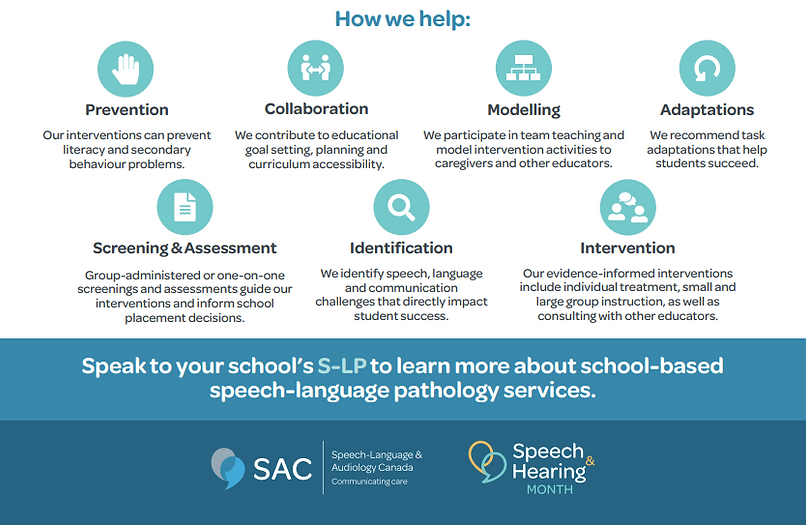A Speech and Language Pathologist (SLP) evaluates, diagnosis, and treats disorders involving communication and biological systems involved with communication. The field of Speech and Language Pathology includes categories such as Ear and Hearing, Articulation, Aphasiology, and Phonemic Awareness. Speech utilizes many biological systems, and any damage or disorder will disrupt these natural systems. There are many causes of speech and language disorders, so a Speech Language Pathologists has a comprehensive understanding of everything involving speech and language. Even the digestive tract affects your speech!
A speech pathologist will start with an initial assessment. They’ll meet with you, or if this is for your child, they’ll have an initial appointment with just you and then a separate session with your child. Sessions typically last 60-90 minutes. In the early stages of the process, you might be asked to fill out a questionnaire. This questionnaire gives us answers to questionnaires that we always have to ask, so we’re saving you time and money.
Speech assessments look at how one is using speech sounds, how the voice sounds, dysfluencies in the speech output, understanding of language and uses of language. Certain assessments can also look more specifically at problem-solving skills, social skills and literacy skills.
sourced from: https://www.seattlechildrens.org/clinics/speech-and-language/
Articulation and phonology:
Articulation and phonology disorders affect the way a child pronounces certain sounds. They have to do with errors making individual vowel or consonant sounds (articulation disorders) and overall patterns of errors in speaking (phonological disorders).
Autism Spectrum and Social Communication:
Autism can affect the way a child behaves, thinks, communicates and interacts with others. We work with providers from the Autism Center to evaluate children with social communication disorders, including autism.
Cognitive Communication:
Cognitive-communication disorders involve problems with thinking processes that affect communication, such as memory, reasoning and problem solving.
Feeding and Swallowing:
Speech-language pathologists evaluate and treat problems with eating, drinking and swallowing. We provide feeding and swallowing evaluations (described below) if there are concerns about your child being able to eat and drink safely, without food or liquids going into their lungs when they swallow (aspirating).
Fluency:
A fluency disorder means there’s a problem with the natural flow of speech. Children with fluency disorders may stutter or stammer when they speak.
Motor-Speech:
Children with motor speech disorders have problems moving their mouth for speech. Causes may include weakness of the muscles used for speech (dysarthria) or difficulty coordinating the muscle movements needed for speech (apraxia).
Reading, Writing, and Fluency:
Speech and language disorders affect not only a child’s ability to talk, but also reading, writing and comprehension.
Receptive and Expressive Language:
Children with language disorders have trouble understanding spoken and written language (receptive language disorders) or using language to communicate their ideas and questions (expressive language disorders). Some children have trouble both understanding and using language.
Selective Mutism:
Selective mutism is an anxiety disorder where children do not speak in certain settings or with certain people despite speaking in other settings.
Severe Communication Impairment:
This refers to any problem that profoundly impairs the ability to communicate with words (verbally). Often children with severe communication impairment have another condition, such as Down syndrome, cerebral palsy or another developmental delay. Augmentative and alternative communication (described below) may help your child.
Voice Disorders:
Children with voice disorders may sound hoarse, breathy or higher pitched or low pitched than usual, or they may have lost their voices.

Sourced from Speech-Language & Audiology Canada
If you have questions regarding occupational therapy services, please contact our client relations team.